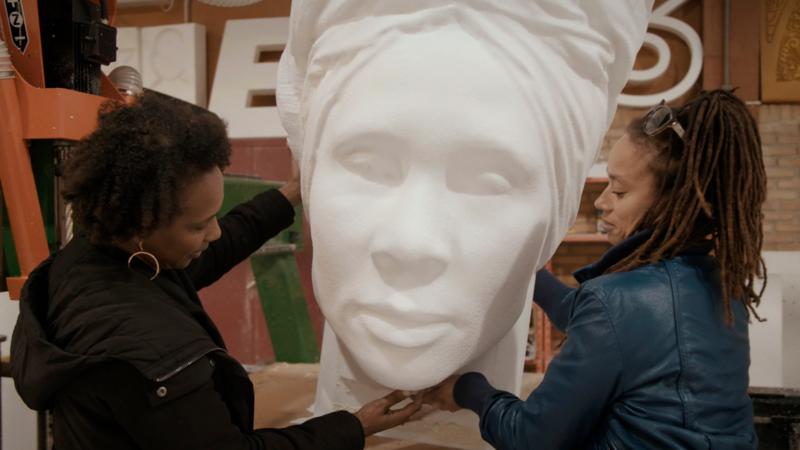
Jeannette Ehlers is an artist and her entire work is concerned with the concept of structural racism. For instance, she did a performance and a video constellation in which she wears African inspired makeup and is whipping a canvas with black charcoal.
But she wasn’t always like this. Director Maya Albana, whose father is from Malaysia, has known Jeanette most of her life. As children and teenagers they had much in common in that both of them had a dark-skinned father and a white mother. These were ties that bound them together in the 80s in the suburbs, and Jeannette and Maya would lovingly refer to each other as ”the Negro” and ”the Asian” - until one day Jeanette decided to put a stop to all that.
Jeannette got to know her father when she was 15. He was from the Caribbean, descendant of enslaved Africans, who were shipped out from Ghana. As the centennial for the abolition of slavery approaches, Jeannette decides to construct a monument – a gigantic statue of the female rebel Queen Mary. She was one of the main rebel leaders in one of the first Danish labour revolts, an uprising called Fireburn. The revolt aimed to change the horrific/inhumane living conditions of the plantation workers.
Maya follows Jeanette on this journey, camera ready, in an attempt to uncover where Jeannette’s black consciousness might come from – and how it arose.
But she wasn’t always like this. Director Maya Albana, whose father is from Malaysia, has known Jeanette most of her life. As children and teenagers they had much in common in that both of them had a dark-skinned father and a white mother. These were ties that bound them together in the 80s in the suburbs, and Jeannette and Maya would lovingly refer to each other as ”the Negro” and ”the Asian” - until one day Jeanette decided to put a stop to all that.
Jeannette got to know her father when she was 15. He was from the Caribbean, descendant of enslaved Africans, who were shipped out from Ghana. As the centennial for the abolition of slavery approaches, Jeannette decides to construct a monument – a gigantic statue of the female rebel Queen Mary. She was one of the main rebel leaders in one of the first Danish labour revolts, an uprising called Fireburn. The revolt aimed to change the horrific/inhumane living conditions of the plantation workers.
Maya follows Jeanette on this journey, camera ready, in an attempt to uncover where Jeannette’s black consciousness might come from – and how it arose.
| Original title | Det sorte kapitel |
|---|---|
| Danish title | Det sorte kapitel |
| Keywords | Denmark, Denmark's history, Colonialism, West Indies, The, Slavery, Africans, Memorials, I Am Queen Mary, Artists, Ehlers, Jeannette, Personal history, Belle, La Vaughn |
| Director | Maya Albana |
| Producer | Helle Faber |
| Director of Photography | Nicki Sørensen, Emil Langballe, Henrik B. Ipsen, Maya Albana, Sarah Jane Del Castillo Jonassen, Amdi Brøner |
| Editor | Line Schou |
| Sound | Kristian Selin Eidnes Andersen |
| Composer | Troels Abrahamsen |
| Appearance | Jeanette Ehlers, Maya Albana, La Vaughn Belle, Noor Nørgaard Albana |
| Production country | Denmark |
| Domestic distribution | Danske Filminstitut |
| Danish rating | Not recommended for children under 7 |
Download PDF